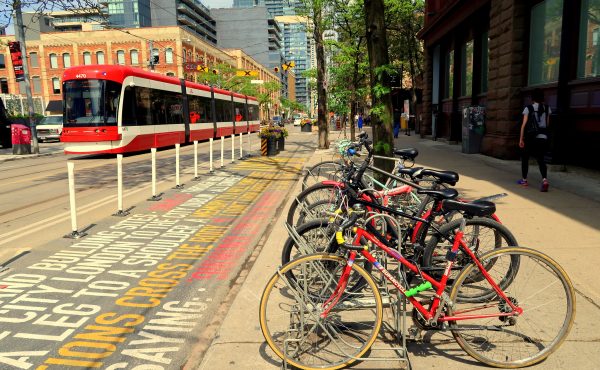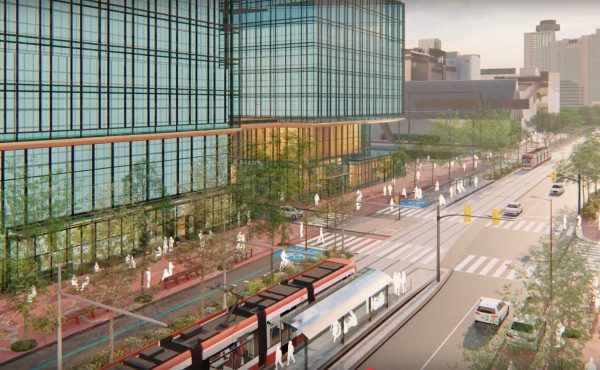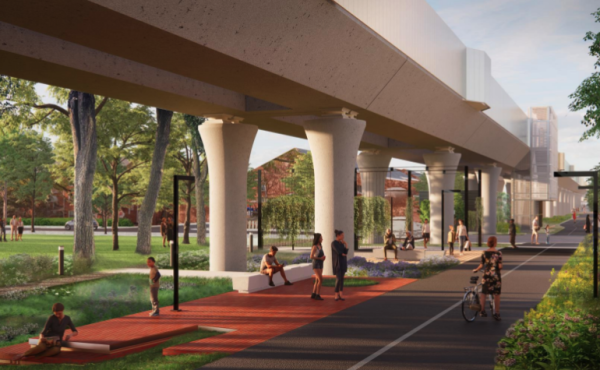

David Miller’s lawyerly silence about the broader implications of the Bryant-Sheppard tragedy is, to use one of the mayor’s favorite terms, unacceptable.
No, I’m not expecting him to speak out about the specifics of their fatal encounter, which is before the courts and thus off-limits to political commentary.
But this incident, more than any other cycling fatality, has crystallized the brewing sense of tension between drivers and riders. As mayor, Miller has a duty to directly address the people of Toronto about the state of our roads as a means of de-escalating the polarized atmosphere of confrontation and recrimination.
He could, without prejudicing the case, urge the importance of mutual respect, and call on both those who drive and those who ride to re-double their efforts to acknowledge one another’s humanity and fragility as they navigate city streets.
He could urge calm, and ask the citizens of the city to refrain from pre-judging either Darcy Sheppard or Michael Bryant.
He could propose the establishment of some kind of citizen’s forum to bring together drivers and riders — and not the usual suspects — to develop new ideas about how to improve the day-to-day relationship between the two groups.
He could speak frankly — as I’ve argued in the magazine — about the profound safety failings of Toronto’s approach to bike lanes and how these contribute to the chronic unease experienced by both drivers and cyclists.
He could say that it shouldn’t — mustn’t — be a war out there, and that we all have a moral obligation to step back from the brink.
I understand why Miller’s been silent. It’s election season, and he gets enough grief as it is from the anti-bike crowd. But there’s no doubt that Sheppard’s death is a turning point in Toronto’s fraught relationship with the bicycle. David Miller, of all people, should be playing a central role in guiding the city into this new era.
photo by Matthew Blackett




25 comments
Very true. Not a “tweet” from @mayormiller nor anything else from this guy. It would be so simple to issue a statement without taking sides. We can’t let news media and opinion pieces and web site forums be the only place for discourse, this is our city and our mayor needs to address this issue, or is he simply waiting until it’s too cold for many to bike?
I’ve always been a supporter of David Miller, but I agree. Miller’s been walking on egg shells recently. He needs to step up and stop being so silent about this and other issues. I understand that he’s busy but I’m disappointed that he hasn’t spoken about the the diesel train issue in the Georgetown Corridor. These issues may be politically difficult but good leadership calls for words. Even if he doesn’t swing one way or the other, it’s important to show that these things are on his radar. Ignoring the issues makes him seem like he doesn’t care about them. He’s got a great record and I trust his opinions. Hiding out doesn’t help anyone.
Although under Miller we’ve seen the City positively move forward on cycling infrastructure (Jarvis bike lane), it’s all been far too slow and fraught with disappointments (Bloor bike lane). With all the rhetoric on how we should clamp down on cyclists, it would have been helpful for our so-called bike-friendly mayor to speak out. Good job calling him out John!
The Toronto Bike Messenger Association has established a memorial fund for funeral arrangements and to give support to his children.
Donations are being accepted at http://www.tobma.com via Paypal and in person at any TD Canada Trust location. Please reference Darcy Alllan Sheppard and/or account number 06906676860 to donate in person.
There will be a fundraising event on September 19th, location TBA. Check http://www.tobma.com for updated information or join this Facebook event http://www.facebook.com/event.php?eid=125621767851 to get an update. You are all invited, please come if you can.
Thank you,
Members of the TOBMA
found on tino’s blog, so what if the mayor isn’t doing or saying anything, that is a way anyone can say the right thing by donating to this fund for the poor guys kids
Miller rarely makes a strong statement about anything. That said, this story isnt about cycling its about drinking and violence.
Mayor Miller is correct in not addressing this issue through the prism of drivers vs. riders. This issue has more to do with addiction and general decency than modes of transport.
At the risk of being unpopular here, but in the interest of debate, I disagree with this article. I don’t think the Bryant/Sheppard incident has much of anything to do with cycling infrastructure.
From the allegations and witnesses, I read that Bryant ‘bumped’ Sheppard’s rear tire on purpose to get him to move, and Sheppard retaliated by bashing the car’s hood, grabbing/swinging at Bryant, then holding on to the car as it sped away. I think the only infrastructure that could’ve prevented this incident would’ve been a totally segregated bike lane. I’m supportive of protective bike lanes, but they’re not going to be installed on every street. This is more about people’s attitudes toward sharing the road, and the Bryant/Sheppard incident was an extreme case. Neither Bryant nor Sheppard should’ve acted they way they did, no matter how frustrated they were. While we’ve all experienced some ‘sharing issues’ driving, cycling or walking, we don’t normally use cars to push people or attack cars and/or the drivers. As a cyclist and pedestrian, I don’t think this incident was the ‘culmination’ of anything – we don’t normally get in fights with strangers, nor do we bully them. From my own personal experience, I think we all do a pretty good job of watching out for one another and when we cut each other off, we’re normally apologizing to one another.
I think the mayor was right to not use this incident as a means to ignite a discussion on improving cycling infrastructure or sharing the road. Just look at the ‘discussion’ that occurred in the comment sections of the Star, Globe and BlogTO. Most of it followed the non-logic of “I was hit by a car on my bike, therefore all drivers are assholes,” or “I’ve seen a reckless cyclists, therefore all cyclists are assholes.” Even advocates of cycling have submitted to the notion that cyclists shouldn’t listen to music, implying that a car’s booming stereo is just fine.
I do, however, hope that Adam Vaughan’s ideas for redesigning Richmond are approved by council. I hope the mayor will get a discussion going about cycling infrastructure, perhaps as the spring approaches. My biggest hope, however, is that Miller decides to not run for mayor and, popularity be damned, use his last year to push through some radical plans that are unpopular with the ‘car crowd.’
I agree the incident was not really a bike/car issue–but–in the public forum it had become a bike/car issue. The nature of the rhetoric on both sides had been inflammatory and could lead to other confrontations.
As mayor, Miller has a duty to speak out and bring some calm to the debate.
I’m sorry, but I think Lorinc is so off base on this one … almost as off base as Lorinc’s mid-strike article from a few week’s back calling the Mayor’s handling of that unfolding situation ‘letter perfect’. (And I thought he made so much sense in his piece last week.) With respect to this incident, I think the Mayor’s caution is what is needed. Yeah, he can do the many things suggested above — and his words will be twisted 10 ways to Tuesday. Not only that, but talking at any significant length about this issue will likely draw him into commenting on what have become ‘hot button’ issues that he probably doesn’t want to get any where near at this point — like bike infrastructure, but also like drinking and riding, like bike licencing (whether for couriers or all riders), like the seemingly perpetual state of construction on roads. The Mayor knows this incident has brought to the surface out extremely strong feelings and resentments on oh so many issues from all quarters. And I think he is acting accordingly.
The video evidence shows that the cyclist was rear-ended by Bryant so it’s totally a cycling/car issue…
Video link
http://bikelanediary.blogspot.com/2009/09/annotated-video-of-allan-sheppards.html
I think John Lorinc is absolutely right here.
In my mind this is more of a drunk-driving issue than a car-vs-bike issue.
The strange thing is, I predict John Tory to enter the race with some positive ideas on this issue.
As others have said, this is a minefield into which the mayor shouldn’t wade. This is about criminal behaviour, intimidation and class. God knows we need to address class in this city, but I don’t know what is the avenue to convince ‘taxpayers’ that a society is better served by reaching out to all of its members, rather than alienating those who cannot ‘pay their own way’. We are steadily becoming a more class and income divided city, and it wasn’t always so stark.
If the mayor wants to address transportation, talk is going to impress nobody, least of all me. Partly because of the sense of entitlement I alluded to above, but also because of poor policing, the driving in Toronto is unacceptable. If the police would consistently address the kind of driving that puts all road users in danger (mainly aggressive car driving, as bikes kill about 0.6% as many people in a year), we’d have the driving we should. The mayor should address how traffic is policed.
I was in Tokyo for August, which has far more road users of all types in a given space. I felt far safer, because the culture there is for people to obey the traffic rules, and defer to whomever has the right-of-way, rather than it be stolen by whomever is the most intimidating. We should fine our society into that kind of culture!
One more comment: if Bryant had been on a carbon-fibre racing bike, and Sheppard in an old beater (convertible even), the same altercation happened, the cyclist died, and Sheppard gone to ‘the Hyat’ after leaving the scene, do you think Sheppard wouldn’t be rotting in the Don now? If you don’t see my point, keep drinking the ‘justice is blind’ and ‘equal opportunity’ cool-aid.
I think Miller and McGuinty are right to say nothing, anything said would inflame the rhetoric of their enemies and might influence the case.
The people on both sides who need to turn it down a notch wouldn’t change their opinions one bit.
Glen, I presume the “addiction” you are referring to involves misuse of alcohol and street drugs, not car addiction. Not to play down the great social harm caused by the former, but the latter is, er… destroying our planet. And sadly, car addiction is not even recognised.
People are right to say that the death isn’t a bike/car issue, but you would be wrong to say that it hasn’t become a bike/car issue; it is the most recent catalyst.
Regardless of the reason for the accident, the reaction of the public shows the frustration felt by drivers and cyclists.
Everyone’s pissed off–drivers and cyclists alike–and this incident gave them something to yell about. Regardless of what the accident was really about, it’s obvious that people are *angry* about the City’s treatment of bikes (whatever they believe that to be).
Is it so wrong to expect Miller to address his citizens’ ire?
@jamesmellon: “We are steadily becoming a more class and income divided city, and it wasn’t always so stark”.
When was it not so stark?
To Mike W. regarding jamesmellon’s point that “We are steadily becoming a more class and income divided city, and it wasn’t always so starkâ€Â. I don’t agree with everything jamesmallon says but anyone who follows the stats knows he is right on this one.
30 years ago, Toronto was much less polarized in terms of income and class. Increasingly, Toronto is becoming a place for either the very wealthy or the very poor. Many reasons for this of course, including: real estate prices in TO rising beyond the means of moderate income people; considerable loss of mid-level income jobs within TO’s boundaries, particularly manufacturing jobs, to offshore and even to other parts of the GTA (Glen’s frequent point); disproportionate share of GTA’s social housing stock within Toronto’s boundaries; pattern of new immigrants locating in TO during their economically challenged phase (due to TOs greater amenities/services for the poor) then moving out to other parts of the GTA once they become established.
lagatta à  montréal,
My GABA A alpha5 receptors do not show any preference for automobiles. I am referring to real mental health issues. There is a reason car addiction is not recognized, it is because there isn’t one.
Bullshit Glen. Our entire society is car-addicted.
Addiction also refers to doing something that is harming us, and not being able to stop. It doesn’t always involve “substances” (though of course petroleum is a substance); think of gambling addiction.
Here society’s addiiction is causing social and societal harm of the first order, increasing physical illness as well as accidents, contributing to obesity, destroying the urban form, requiring irreversable harm to the environment such as the Alberta tar sands and causing even more irreversable harm to the climate and to life on earth.
That’s not an addiction?
Nope. That is habit, not addiction!
Only because you narrowly define addiction for your own semantic purposes so that you can tell yourself you are right.
The fact is that it also means enthusiastic devotion to a specific thing or activity while you limit your usage to chemical addiction only.
That isn’t habit, car-addicted is a proper definition of western societies proclivity toward automobile use regardless of the effect good/bad on itself.
Almost at the spot where Mr. Sheppard was left, I had a chat on my bike with Mayor Miller during the Bike to Work week ride to City Hall, and I bugged him about Bloor bike lanes. Mr. Miller hemmed, and seemed more worried about avoiding road hazards than the question, but he mentioned ensuring merchants were Ok with things like bike lanes, as I recollect, not having a recorder with me.
Sadly, the City’s inability to provide bike lanes on Bloor as recommended 18 years ago, has likely set the stage for these tragedies, and the new road will be more unsafe for cyclists in some ways, as the curb lanes will not be terribly wide.
We are terribly behind – I call the place Caronto the Carrupt – and it is sad that such a great opportunity for designing a road for the greenhouse century is so totally blown.